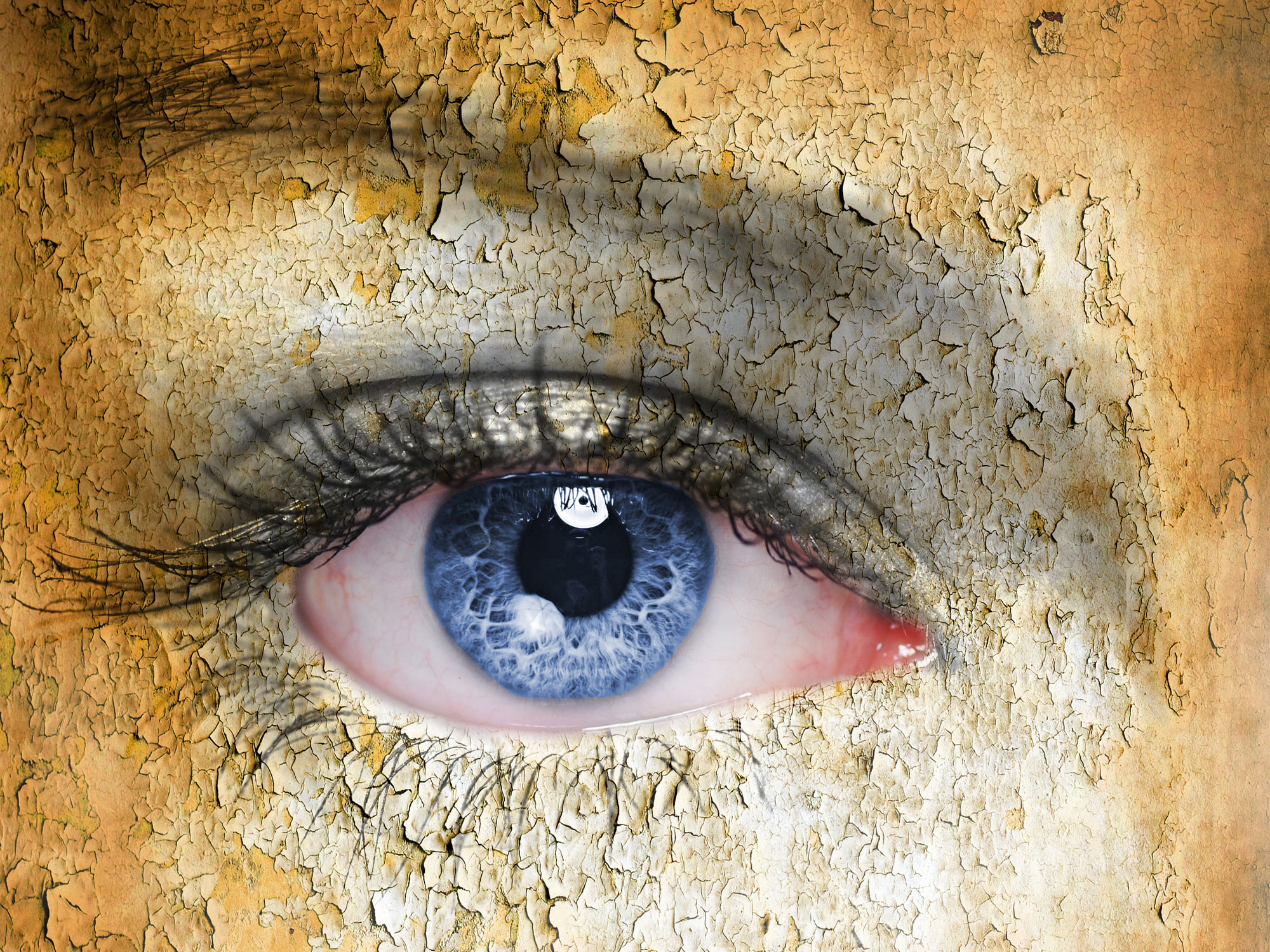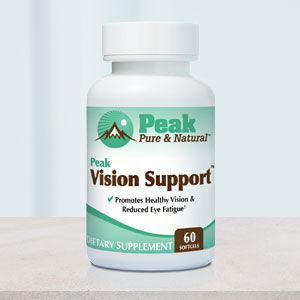Get Easy Health Digest™ in your inbox and don’t miss a thing when you subscribe today. Plus, get the free bonus report, Mother Nature’s Tips, Tricks and Remedies for Cholesterol, Blood Pressure & Blood Sugar as my way of saying welcome to the community!
4 ways to treat chronic dry eye without drugs

Chronic dry eye can drive you crazy…
The burning. The itching. The redness. It might even feel like you have something stuck in your eye all the time.
It’s enough to make you desperate.
So desperate you’d do anything in the world just to have something most people take for granted—enough tears to lubricate your eyeballs.
Unfortunately, there’s nothing drug companies like more than desperation…
That’s why, in 2016, they took $1.5 billion from Americans with chronic dry eye and gave them a drug that doesn’t work… Restasis®.
The Restasis racket
For years, you’ve seen commercials for a drug called Restasis that’s designed to treat chronic dry eye. Well, it turns out, this drug doesn’t do much (if anything) for people with chronic dry eye. And the FDA has known this for nearly 20 years…
Back in 1999, the company that makes Restasis submitted an application for the drug to the FDA, and the application failed. The FDA’s advisory committee voted unanimously that it wasn’t effective enough to pass.
Fast forward four years and the application for Restasis was up for review again. But this time it was approved… even though the drug hadn’t gotten any more effective in clinical trials.
Regulatory agencies in other countries weren’t so quick to approve this ineffective drug, however. Australia’s regulatory agencies looked at the same clinical trials the FDA looked at and determined that it doesn’t have any real benefit for patients, so they didn’t approve it. Officials in the European Union and New Zealand also refused to approve it.
Canadian officials did approve Restasis for a smaller group of patients but recommended that Canada not pay for it, because they weren’t convinced it had any benefit either. Right now, no prescription drug plan in Canada covers Restasis.
So if Restasis doesn’t work, why did Americans spend over a billion dollars on it in 2016?
Because Allergan (the company that makes it) did a heck of a job marketing it. They spent $645 million in advertising over a one year period. They even created a website (mydryeyes.com) that convinces people who have itchy, watery eyes that they have a disease and that the only option is medication. The site even contains a “doctor locator” that includes mostly doctors who are paid by the drug company.
Now, this is a major deception. And researchers from Dartmouth College aren’t happy about it.
“Disease awareness campaigns — like chronic dry eyes — are an effective way for companies to sell a disease to sell a drug. But people shouldn’t assume that you even need a drug to treat symptoms — or that the advertised drug actually relieves the symptoms,” says Steven Woloshin, a physician-researcher at The Dartmouth Institute for Health Policy and Clinical Practice who recently published an article about Restasis in JAMA Internal Medicine.
Woloshin and his fellow researcher Lisa Schwartz say that even though chronic dry eyes is uncomfortable, it’s not a disease. In fact, it’s usually a symptom of another condition or disease.
So rather than take a prescription drug for your chronic dry eye that doesn’t work, it’s time to get to the root of your problem by asking yourself… what’s making my eyes so dry?
Questions chronic dry eye sufferers need to ask
The first step to fixing your chronic dry eye is to figure out what’s causing it. So start by asking yourself these questions:
- Am I taking medication, like antihistamines, decongestants, antidepressants, birth control pills, hormone replacement therapy, anxiety medication, Parkinson’s disease medication or high blood pressure medication? All of these can cause chronic dry eye.
- Do I have a history of seasonal allergies? Or am I experiencing other allergy symptoms? Allergies are a leading cause of dry eyes.
- Do I have an autoimmune disease? Sjögren’s syndrome, lupus, scleroderma, and rheumatoid arthritis can all cause dry eyes. Diabetes and thyroid disorders can also cause them.
- Do I have rosacea (an inflammatory skin disease) or blepharitis (an inflammatory eyelid disease)? These conditions can disrupt your eye glands, which leads to dry eyes.
- Do I have a vitamin A deficiency? If you’re not getting enough of this important vitamin, it could show up in the form of dry eyes.
- Am I pregnant or going through menopause? If so, shifting hormones could be making your eyes dry.
- Do I stare at screens too much? If you do, you may not be blinking enough, which can make your eyes dry.
- Am I regularly exposed to windy, smoky or dry environments? These can cause your tears to evaporate and give you chronic dry eye.
- Have I had laser eye surgery? This can cause a temporary case of dry eyes.
By going through this list of questions, you should be able to figure out what’s making your eyes so dry. It might even be more than one thing. Then depending on the cause(s), search for a long-term solution for both problems. That may mean switching medications, balancing your hormones, taming your allergies, cutting down on your computer use, or whatever’s necessary to keep yourself healthy and your eyes lubricated.
Of course, this isn’t a quick fix. So if you want to take action while you search for a long-term solution, you can also try at-home remedies like:
- Over-the-counter teardrops. They’re only a Band-Aid solution, but they can ease your symptoms while you figure out something more permanent. The key is to use them even when you’re not having symptoms to prevent your eyes from getting dry in the first place.
- Omega-3 supplements. A 2013 clinical trial showed that omega-3 supplements significantly improved dry eye symptoms in 65 percent of people who took them.
- Tea and Coffee. Studies show caffeine can increase tear production.
- Cut back on sugar, artificial sweeteners and complex carbs. There’s evidence that eating too much sugar can aggravate eye problems, including dry eye.
Also, stay up on your vitamin D. A study published in the International Journal of Rheumatic Diseases found 52 percent of women deficient in vitamin D had dry eyes. Only 4 percent of the women who weren’t vitamin D deficient had dry eyes.
Editor’s note: While you’re doing all the right things to protect your brain as you age, make sure you don’t make the mistake 38 million Americans do every day — by taking a drug that robs them of an essential brain nutrient! Click here to discover the truth about the Cholesterol Super-Brain!
Sources:
- Facts About Dry Eye — National Eye Institute. Retrieved January 3, 2017.
- Restasis: Why US consumers paid billions for drug deemed ineffective in other countries — MedicalXpress. Retrieved January 3, 2017.
- M. Schwartz, MD, MS; S. Woloshin, MD, MS. “A Clear-Eyed View of Restasis and Chronic Dry Eye Disease.” — JAMA Internal Medicine, 2018.
- A randomized controlled trial of omega-3 fatty acids in dry eye syndrome — International Journal of Ophthalmology, 2013; 6(6): 811–816.
- Caffeine and Dry Eye — American Academy of Ophthalmology. Retrieved January 3, 2017.
- Natural remedies for dry eyes — Medical News Today. Retrieved January 3, 2017.
- The Impact of Sugar Consumption on Eye Health — Boston Sight. Retrieved January 3, 2017.














